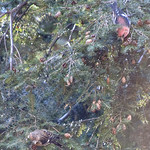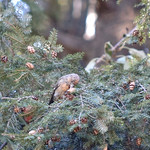



White-winged Crossbills on hemlocks near Kingsley Park, November 4, 2012. An unusual bird for this area. Part of a wider incursion (or "irruption") this year of crossbills and other finches that usually winter much farther north. What's neat about this influx is that scientists predicted it. Periodically, northern conifer forests have low seed crops over large geographic areas. In seed-poor years, finches have to travel farther south than usual to find enough food. So this is an ecology-based prediction: because of low food resources the birds have to expand their winter range (and/or switch food resources), with the energetic tradeoffs that involves. White-winged Crossbills are specialists on the small, tight cones of spruce, mainly. But when they wander into the range of Eastern hemlock, they will stop at hemlocks for a meal.
Look at this remarkable contrast between last year and this year:
2011 vs. 2012
White-winged Crossbill sightings in eBird
| |
|
|
Aug-Nov 2011
(good seed-crop year in Canada)
"This winter's
theme [2011] is that cone crops are excellent and extensive across much of
the boreal forest and the Northeast. It will not be a flight year."
|
Aug-Nov 2012
updated Nov 14 (last 30 days marked in orange)
(poor
seed crop year in Eastern Canada)
"The theme
this winter is that each finch species will use a different strategy to deal
with the widespread tree seed crop failure in the Northeast." --Ron Pittaway, Winter
Finch Forecast, 2012
|
Source: www.eBird.com


This blog was... how do I say it? Relevant!! Finally I've found something that helped me. Thank you!
ReplyDelete